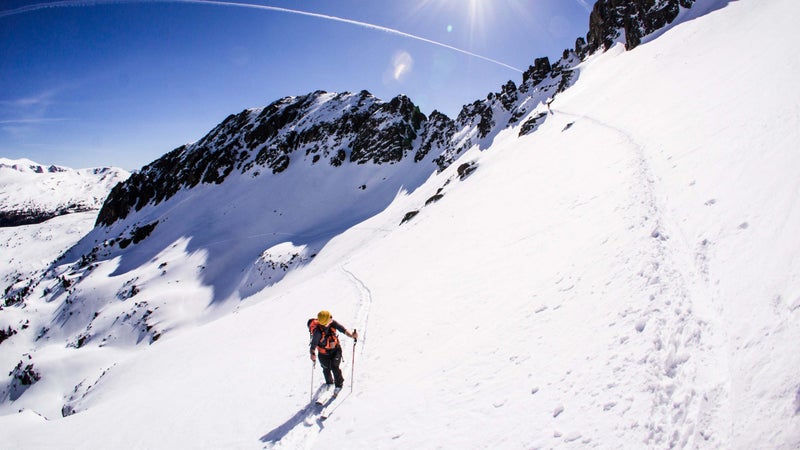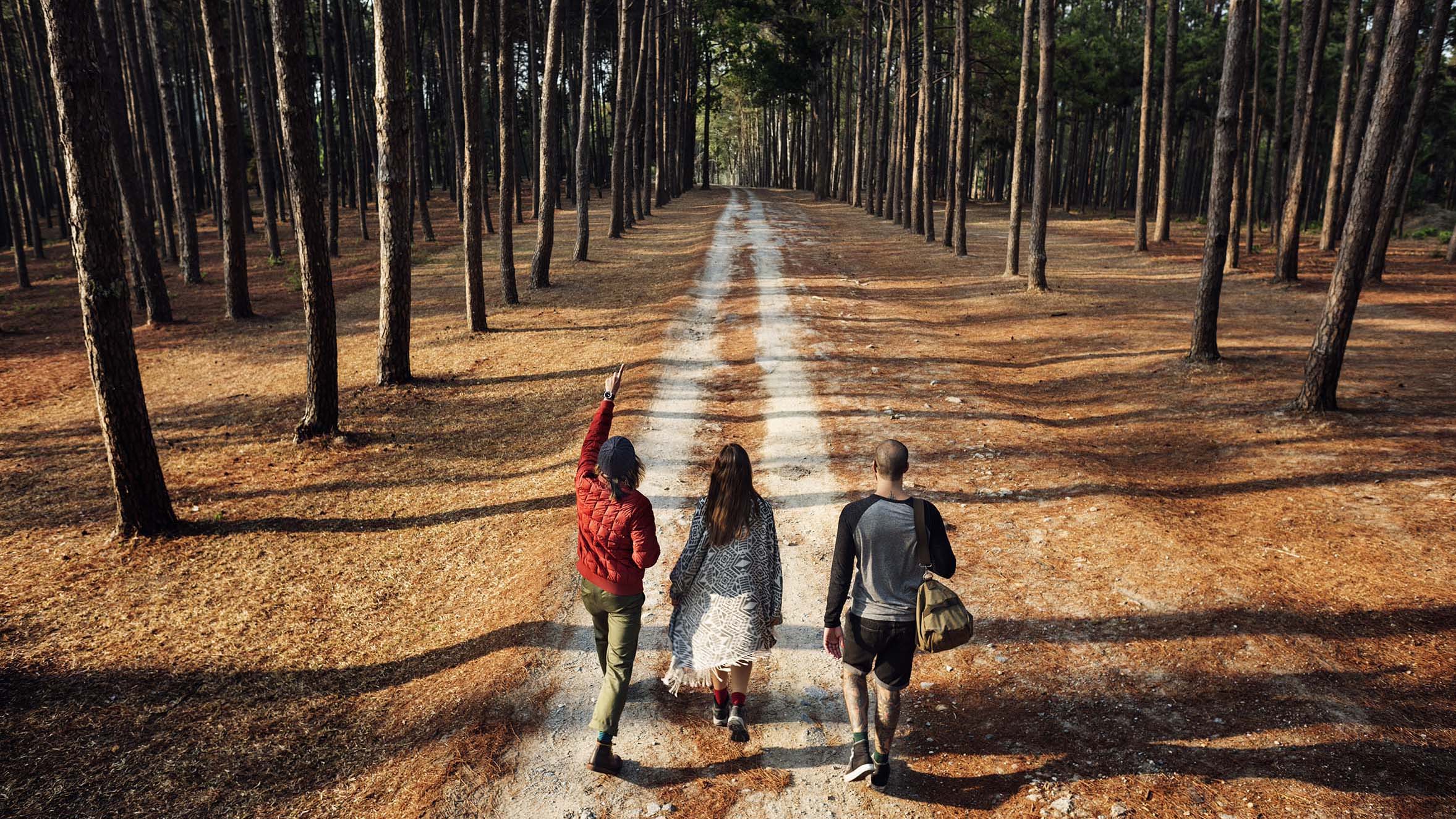Six months before COVID-19 put the world in quarantine and global tourism screeched to a halt, Andy Wirth, the former CEO of Squaw Valley/Alpine Meadows, gave a talk to adventure-tourism graduate students at his alma mater, Colorado State University. The theme? For the past decade, the buzzword in business has been “disruption.” Moving forward, said Wirth, the focus will be on “resilience.” In the long term, Wirth told the group, success isn’t about mere disruption, it’s about being adaptable enough to weather rapid change.
To make his point, Wirth, a lifelong outdoor enthusiast who cut his teeth fighting fires in northern New Mexico, relayed a story from his formative years. He recalled how, as a young firefighter, he had a tendency to tunnel his vision and feverishly work at the pace of a wildfire, running his chainsaw dull and then moving to the next log without looking up. But as he grew more seasoned, Wirth adopted a different approach and would periodically stop to gather himself and calmly sharpen his saw.
Doing so, he found, made him more efficient (the sharper saw) and more adroit in his next movements (the perspective granted by the respite). Even in chaotic situations, says Wirth, who now heads up the Kingdom of Saudi Arabia’s new Mountain Sector tourism initiative, one must breathe, hone tools, and see a way forward. “It’s a lesson I learned in the mountains and in my business career,” says Wirth. “There’s intense value in taking a pause.”
If there ever was a time to take a breather and reassess, now would be it. There are strong arguments to be made that the current economic suspension, as devastating as it is in the near term, is also an opportunity—if you take the time to recognize it. This is especially true when you consider that entering a job market during a recession can be detrimental for your lifelong income. According to one study, new hires during the Great Recession of the late 2000s took lower salaries that on average reduced their earning capacity long-term by as much as 20 percent.
“Pursuing a degree to support your career in adventure tourism is a labor of love. In the beginning, that love might be for skiing, hiking, or riding bikes, but it grows deeper and wider in meeting people, making the world smaller, promoting healthy living, and acting as an environmental steward.”
Use this time to pursue an advanced degree or certification, though, and you might just enter (or reenter) the job market on the upswing. Even better, you may find that your newly earned skills not only differentiate you from the pack, but significantly boost your earning potential. Over a lifetime, a master’s degree can raise your income by as much as 36 percent. And perhaps the best part is that earning that advanced degree no longer necessarily requires years of study or even a major interruption to your life.
If you love to travel, want to live an outdoor lifestyle, or see tourism as a force for good in the world, programs like CSU’s Master of Tourism Management (MTM) program can be completed online in as little as nine months and are designed to be flexible for working professionals and nontraditional students.
“It’s really a chance to bolster your career,” says Sam Martin, CSU’s Director of New Enterprise Programs. Classes are taught by acclaimed adventure-tourism professionals, like Martin, with real-world experience and contacts, and fields of study include sustainable tourism, ecotourism, strategic management, data analysis, conflict management, and tourism marketing. “It’s time to act,” says Martin. “The Roaring Twenties happened after the Spanish Flu of 1918. Use this time wisely while we wait for the industry to recover.”

And recover it will. While many industries will take a long time to rebound, travel in general and many nature-based businesses in particular are poised to make a strong and more immediate comeback. The ski and adventure-tourism industries, for example, were predicted to face prolonged U-shaped recoveries following 9/11 and 2008’s Great Recession. Instead, tourism both within the U.S. and globally grew between 8 and 12 percent following those downturns in V-shaped rebounds. Skiing witnessed similar growth. Another positive sign: before the travel freeze, experiential outdoor travel was as robust as it’s ever been. Global tourism has grown by nearly 5 percent a year for the past 20 years. In the U.S. alone, tourism accounts for more than 8 percent of GDP—and 15.8 million jobs.
The outdoor-recreation business, meanwhile, including gear sales, is worth $847 billion to the U.S. economy. “One thing I’ve learned is that tourism comes out of turbulence stronger and faster than other industries,” says Liz Birdsall, a CSU tourism grad who now helps direct Colorado Tourism’s international promotions through her own business. “I believe in this industry. The human spirit wants to travel.”
In terms of outdoor recreation and local tourism, the recovery is already in motion. Newly reopened ski areas Arapahoe Basin in Colorado and Mount Hood's Timberline Ski Area in Oregon are demonstrating that resorts can operate safely and in a socially distant manner. And the entire ski industry is currently devising ways to expand on that success for the coming season, thanks to the leadership of people like Daren Cole, a recreation-management graduate from CSU and the North American president of the ski-lift and grooming-machine company Leitner Poma.
Cole points to the new gondola-car disinfection systems his company is now experimenting with in Europe as a sign of progress. He’s also highly confident that hardcore mountain bikers, skiers, and outdoors folk—a subset Cole refers to as “pioneers”—will lead the way in the recovery. But even as outdoor recreation slowly turns back on, Cole thinks pursuing an advanced degree is a smart play. Very few outdoor companies make continuing education a priority. It’s up to individuals to pursue their goals. And Cole says that now is the time: “Some of my mentors told me early on to never let a good crisis go to waste,” he says.
None of this is to say that the current crisis won’t be painful in the near term. Restaurants that can’t adapt quickly enough will struggle greatly. And, at least for a while, concerts and other public events are facing dire times. That’s in part why Wyoming is heavily promoting road-trip-style adventure tourism, even while it had to cancel the summer rodeos and frontier days that define the state. But because of its diversity and the safety of open spaces, Wyoming’s outdoor-recreation business will be the first to recover, says recent CSU MTM graduate Amy Larsen, now the Industry Relations Manager with the Wyoming Office of Tourism.
Larsen credits her CSU coursework with helping her to see the big picture in these strange times. “My studies at CSU put me in the position to understand all aspects of the tourism industry,” she says. “I was learning from people with live connections to major ski resorts, international tourism, and the outdoor-gear business.” That broad learning has proven vital lately as Wyoming temporarily shifts from global to regional tourism and looks to support local businesses. “You don’t realize how expansive but connected a tourism company is until it’s under strain,” says Larsen. “A mountain-biking guiding company is only as valuable as the trails the community is building.”
Larsen was able to earn her MTM degree in less than two years, studying remotely and continuing to work full-time. “The online program offers a ton of flexibility,” she says. “And the classes were also all-encompassing. I didn’t realize why I was studying research and marketing at the time—I thought I’d end up in international group tourism—but when I got in the field I realized the value. Tourism is data-driven and the marketing follows. And although I couldn’t have predicted it, the online schooling prepared me for what most of us are dealing with now, working remotely during COVID.”
Global tourism, of course, will be the last sector of the travel industry to rebound. Exactly how and when we return to international travel will depend on a variety of factors, including when borders reopen and how businesses and airlines change their operations. But the one thing all the recent travel research tells us is that travelers are eager to get out there once it’s safe to do so.
When they do, Olga Gachkova, another recent MTM degree recipient, is ready to engage with them. Gachkova, who journeyed from Russia as a Fulbright Scholar to study on campus at CSU, has since returned to Moscow, where she’s now the digital-marketing manager at Travelpayouts. Her responsibilities include working with affiliates, travel bloggers, and outfitters—and advising them on how to reinvent their online platforms during the COVID downturn.
Like many MTM graduates, Gachkova has a particular passion for international travel. “The MTM program is incredibly efficient, with so many classes in nine months,” says Gachkova, “but it provides such a wide offering of knowledge of the travel industry that you can just dive into the studies and figure out a career as you go. Because you learn to understand management systems, you’re ready to adapt to new challenges.”
Ultimately, though, pursuing a degree to support your career in adventure tourism is a labor of love. In the beginning, that love might be for skiing, hiking, or riding bikes, but it grows deeper and wider in meeting people, making the world smaller, promoting healthy living, and acting as an environmental steward. If that prospect makes your heart beat faster, but you’ve been too busy to recognize it, then maybe it’s time to pause, sharpen the saw, and lift your eyes to the horizon.
“The individuals and companies that not only survive such crises but flourish in their wake are optimistic,” says Wirth. “But their optimism is tethered to reality. My optimism comes from knowing that our hunger and need to run rivers, fish a hatch, ride bikes on trail, and ski untracked powder will always be there. Our DNA guides us to those places. That demand is the definition of resilience.”
Colorado State University has provided nationally recognized educational opportunities and outreach services to the tourism and outdoor recreation industries since 1986. The Master of Tourism Management program, and Bachelor of Science in Natural Resource Tourism are offered online or on-campus, with online Graduate Certificates in Adventure Tourism and Ski Area Management.

